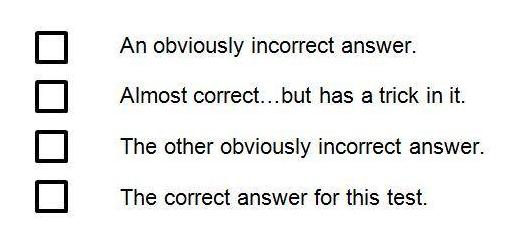 You’ve heard it a million times: do more practice questions, and then do some more. And you’ve taken that advice to heart, but your accuracy isn’t where you think it should be. Sometimes when you review your answers to MBE practice questions it can feel like you’re getting nowhere.
You’ve heard it a million times: do more practice questions, and then do some more. And you’ve taken that advice to heart, but your accuracy isn’t where you think it should be. Sometimes when you review your answers to MBE practice questions it can feel like you’re getting nowhere.
If this sounds familiar, it’s time to start using those questions to improve your score, instead of just using them to measure your accuracy over and over. Here are the best ways to use multiple choice questions to your advantage when studying for the bar exam.
1. Figure out WHY your wrong answers are wrong
It’s easy to simply tally up your correct and incorrect answers and move on. Or maybe you’re reading the explanations as to why you got the question wrong before nodding, vowing not to miss that one again, and moving on. But what you really need to do is figure out WHY you got the question wrong. What was your error? Did you not know the law? Did you misread the fact pattern? Did you misread the call of the question? Or misread the answer choices? Keep track of what mistakes you are actually making, so you can see a pattern of what you need to work on.
2. Use wrong answers as study aids
When you get a question wrong because you didn’t know the law, make a flashcard to test yourself on that point of law. Review your stack of flashcards over and over until you are sure you know the rules you missed. The MBE has what is known as “highly tested areas” so within each subject matter you are going to see the same points of law come up again and again. The more of those highly tested areas you know, the better your accuracy in that subject area is going to be.
3. Read the call of the question before you read the full fact pattern
Start with the call of the question. Read it once or twice, then read the full text of the fact pattern, and read the call of the question again. It’s easy to start thinking about what you are going to be asked when you start at the beginning of the question, and your assumption might be wrong, which will waste your time and potentially lead to a wrong answer. Reading the call of the question first lets you read the question with the call in mind. (This is also very helpful when studying for the essay exam!) This will make you less likely to make the mistake of picking an answer that might lay out the substantive law correctly, but does not actually answer the call of the question.
4. Try to answer the question before you read the answers
Once you’ve read the question, think about what the answer is before you look at the answer choices. Hopefully you know it outright, or have an idea. Then read the answer choices to see if any of them match up with your original answer. This serves two purposes. First, if you have no idea what the answer is, it’s time to study up on that point of law. Second, if you don’t see any answer that matches up with your first thought, maybe you are misreading the question and need to take another look. Finally, if you see your answer, you’ve saved yourself some time and can move on confident that you chose the correct answer.
5. Use REAL MBE questions
Many students find that “practice” questions are easier than real questions from the MBE. There are many places to get real MBE questions. You can get them from some prep books, or directly from the NCBE, which sells 4 full length MBE practice exams on their website. These exams are made up of questions used on previous exams.
Follow these 5 tips and watch your accuracy and confidence improve together! If you are looking for more tips, you can listen to our past bar exam podcasts on the top five bar exam mistakes and mastering the MBE.
All opinions, advice, and experiences of guest bloggers/columnists are those of the author and do not necessarily reflect the opinions, practices or experiences of Solo Practice University®.





















When studying for the NY Bar Exam, I found LEEWS (Law Essay Exam Writing System), which was developed by Rhodes Scholar Wentworth Miller (the father of Prison Break’s actor Wentworth Miller) to be extremely helpful.
His principles applied to answering multiple choice questions as well. Highly recommend it!